牛津高中英语 模块二 Unit3 Reading 复习自创练习+原文&翻译
- 格式:doc
- 大小:40.00 KB
- 文档页数:4
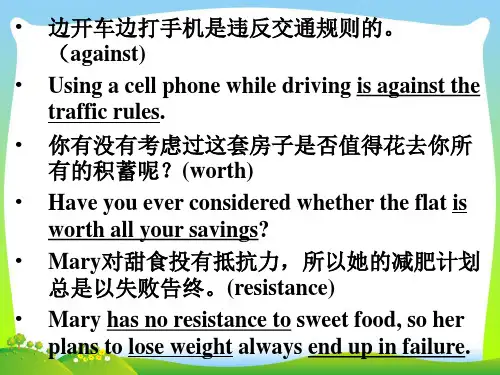
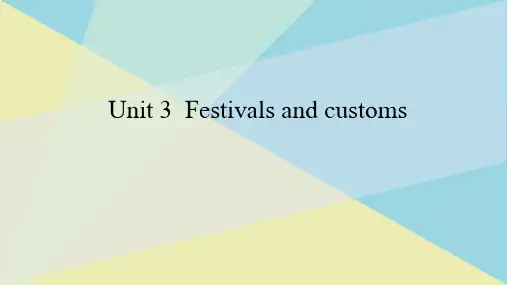
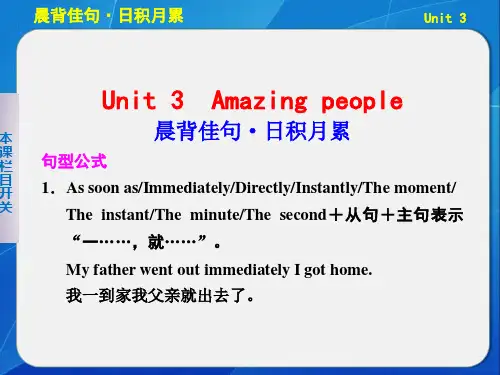
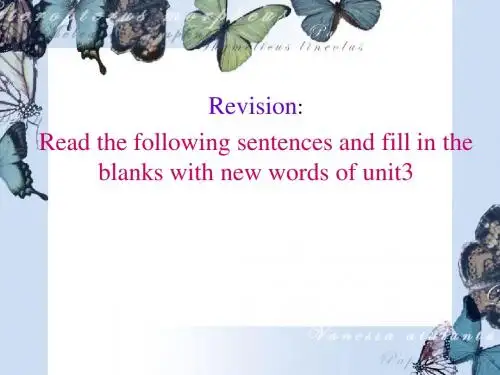

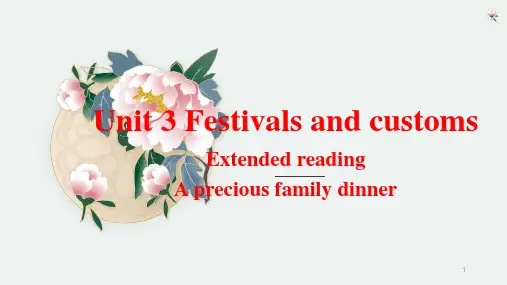
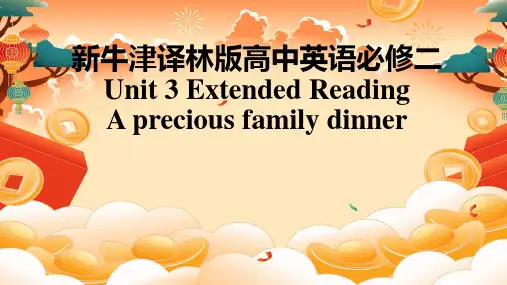
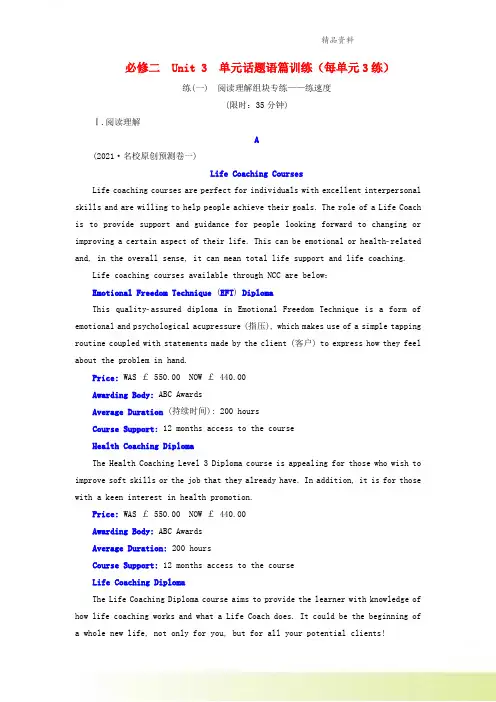
必修二 Unit 3 单元话题语篇训练(每单元3练)练(一) 阅读理解组块专练——练速度(限时:35分钟)Ⅰ.阅读理解A(2021·名校原创预测卷一)Life Coaching CoursesLife coaching courses are perfect for individuals with excellent interpersonal skills and are willing to help people achieve their goals. The role of a Life Coach is to provide support and guidance for people looking forward to changing or improving a certain aspect of their life. This can be emotional or healthrelated and, in the overall sense, it can mean total life support and life coaching.Life coaching courses available through NCC are below:Emotional Freedom Technique (EFT) DiplomaThis qualityassured diploma in Emotional Freedom Technique is a form of emotional and psychological acupressure (指压), which makes use of a simple tapping routine coupled with statements made by the client (客户) to express how they feel about the problem in hand.Price: WAS £ 550.00 NOW £ 440.00Awarding Body: ABC AwardsAverage Duration (持续时间): 200 hoursCourse Support: 12 months access to the courseHealth Coaching DiplomaThe Health Coaching Level 3 Diploma course is appealing for those who wish to improve soft skills or the job that they already have. In addition, it is for those with a keen interest in health promotion.Price: WAS £ 550.00 NOW £ 440.00Awarding Body: ABC AwardsAverage Duration: 200 hoursCourse Support: 12 months access to the courseLife Coaching DiplomaThe Life Coaching Diploma course aims to provide the learner with knowledge of how life coaching works and what a Life Coach does. It could be the beginning of a whole new life, not only for you, but for all your potential clients!Price: WAS £ 408.00 NOW £ 326.40Awarding Body: NCFE CertificateAverage Duration: 200 hoursCourse Support: 12 months expert tutor support语篇解读:本文是一篇应用文,主要介绍了人生教练的工作内容以及三种人生教练课程的相关信息。
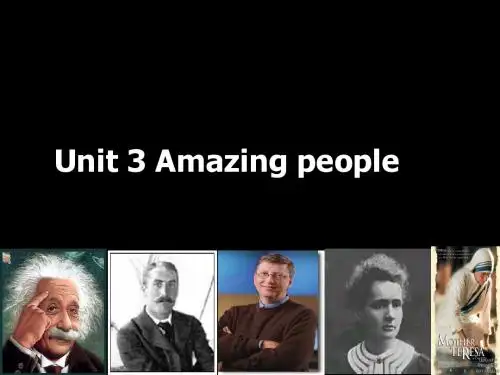
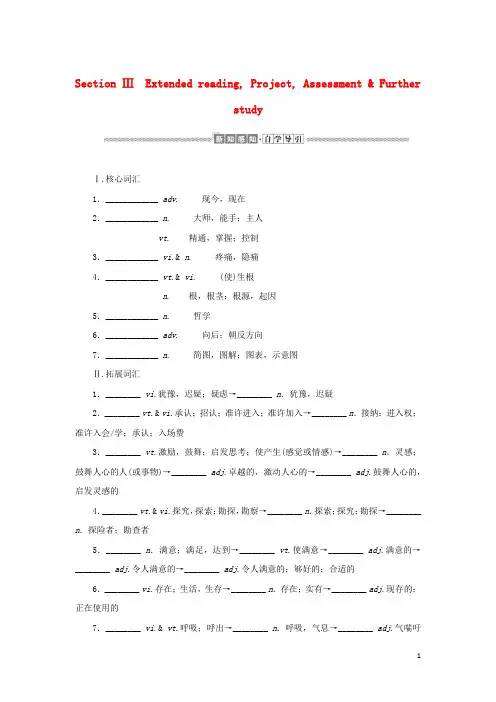
Section ⅢExtended reading, Project, Assessment & FurtherstudyⅠ.核心词汇1.____________ adv. 现今,现在2.____________ n. 大师,能手;主人vt. 精通,掌握;控制3.____________ vi.& n. 疼痛,隐痛4.____________ vt.& vi. (使)生根n. 根,根茎;根源,起因5.____________ n. 哲学6.____________ adv. 向后;朝反方向7.____________ n. 简图,图解;图表,示意图Ⅱ.拓展词汇1.________ vi.犹豫,迟疑;疑虑→________ n.犹豫,迟疑2.________ vt.& vi.承认;招认;准许进入;准许加入→________ n.接纳;进入权;准许入会/学;承认;入场费3.________ vt.激励,鼓舞;启发思考;使产生(感觉或情感)→________ n.灵感;鼓舞人心的人(或事物)→________ adj.卓越的,激动人心的→________ adj.鼓舞人心的,启发灵感的4.________ vt.& vi.探究,探索;勘探,勘察→________ n.探索;探究;勘探→________ n.探险者;勘查者5.________ n.满意;满足,达到→________ vt.使满意→________ adj.满意的→________ adj.令人满意的→________ adj.令人满意的;够好的;合适的6.________ vi.存在;生活,生存→________ n.存在;实有→________ adj.现存的;正在使用的7.________ vi.& vt.呼吸;呼出→________ n.呼吸,气息→________ adj.气喘吁吁的;呼吸急促的→________ adv.气喘吁吁地,上气不接下气地Ⅲ.重点短语1.____________ 身心上2.____________ 使某人入迷3.____________ 武术4.____________ 不足为奇,并不奇怪5.____________ 从……获得灵感6.____________ 内心的平静7.____________ 使某人满意8.____________ 调查,研究;朝……的里面看9.____________ 根源在于,由……产生10.____________ 吸气/呼气11.____________ 造成,引起12.____________ 对……有积极影响Ⅳ.重点句型1.传说13世纪时,一个叫张三丰的道士……创立了太极拳。

Unit 2Language【知识梳理:核心单词】1.occupy vt.占领;占用(时间、空间等)2.raise vt.养育;举起;提高;筹募;提及3.replace vt.替换,代替,取代4.defeat vt.战胜,击败5.ban vt.& n.禁止;取缔6.distinguish vt.区分;使具有某种特征[语境运用]用所给词的适当形式填空1.Last winter when I went there again,they had a big separate house (raise) dozens of chickens.2.“The living-room television (replace) and gets planted in the kids' room,and suddenly one day,you have a TV in every room of the house,” said one researcher. 3.Their classification and analysis (occupy) scientists for years and led to a five-volume report,the last volume being published in 1895.4.The child is perfectly capable of (distinguish) reality from fantasy.拓展单词1.vt.进入;使用n.通道;(使用的)机会→adj.可到达的;可接近的2.vi.相异,有区别→adj.不同的→n.不同3.vt.& vi.贡献→n.贡献,促成因素;捐赠4.n.关心;忧虑vt.涉及;使担忧;对……感兴趣→adj.担心的,关心的→prep.关于5.vt.使尴尬,使难堪→adj.令人难堪的,使人尴尬的→adj.感到尴尬的,难堪的6.adj.方便的→n.方便→adv.方便地,附近地[随堂练习]用所给词的适当形式填空1.He showed for agriculture and wrote two essays it,but he was that neither could be published.(concern)2.My most moment was when I tried to introduce a woman whose name I couldn't remember,and it also made the woman .(embarrass)3.My house is located just off the High Street.It's for you to drop in.Please come at your .(convenient)4.Free Internet at home is a huge step in making online education to everybody.(access)5.From the appearance,we can not tell the between the twins,though they always have some ideas.As for this phenomenon,ideas among many people.(differ)6.WHO welcomes China's of mobile laboratory to west Africa against Ebola,which can to fighting the disease.(contribute)【高频短语】1.导致2.除……之外3.以……命名4.和……不同5.取笑6.=由……组成(构成)[语境运用]选用左边短语的适当形式填空As we all know,English ①Chinese.It ②the grammar and vocabulary.At first I found it hard to learn English.③my poor vocabulary,I had difficulty understanding grammar.Fortunately,my teacher and classmates' help ④my English improving rapidly.7.代表,象征8.曾经,一度;一次9.接近;利用……的机会10.考虑……11.对……做出贡献[随堂练习]选用左边短语的适当形式填空Michael Herr was the author of Dispatches (1977),the best book about the Vietnam war.Herr also ⑤two of the best films on the war,Apocalypse Now and Full Metal Jacket.⑥he ⑦Vietnam as a correspondent for Esquire magazine.In his book,he shared their discomforts and their fears,witnessed their death and recorded their language.12.总体上13.应该14.控制15.经历;浏览,仔细检查[随堂练习]选用左边短语的适当形式填空⑧,whoever learn English hard will succeed in time.I used to ⑨English newspapers and magazines.I picked up some words while reading.Therefore,we ⑩do more reading to improve our English.【考纲词汇精讲】1.occupy vt.占领;占用(时间、空间等);使忙碌(1)单句语法填空①As the final exam is drawing near,all the students (occupy) with their review.②I was fully occupied in (repair) some old tools,so I didn't attend my friend's party last Friday.【总结】(1) .忙于(做)某事(2)occupied adj.忙碌的;占用的(3)occupation n.占领;职业,工作【短语拓展】“忙于(做)某事”的其他常用结构还有:。
牛津高中英语模块二Unit3 Reading 复习自创练习+原文&翻译1有史以来世界上最出名的探险家之一2他天资聪颖,对家乡之外的世界充满了好奇心。
3扬帆远航到埃及4寻找古埃及国王的陵墓5在这些陵墓中,他发现了大量的珠宝和黄金,同时还有已故国王经过处理的遗体,这些经过处理的遗体就是为人所知的木乃伊。
6做出了他最惊人的发现7得到...的资助8在这个地方,他们发现了King T的陵墓。
这是有史以来所发现的最重要的陵墓9除了「法老的木乃伊」之外,这座陵墓还藏有大量的珍宝,比我们任何人先前所见过的都要多。
”卡特说,“在探查过这座陵墓之后,我们将其封起来,并掩藏了其入口。
10接着,在卡特打开陵墓数月后,当时也在陵墓发掘现场的Lord Cannarvon生病发高烧,死在埃及。
11几乎在同一时间12停电13获悉其奇怪死讯14死于心脏病15一直活到了65岁16一个科学的解释17有人说所有那些死亡只是巧合。
另一些人则相信这与木乃伊的诅咒有关,是对闯入亡灵安息地的人的惩罚18陵墓被打开时,新鲜的空气搅动了这些病毒。
一旦被人吸入,它们就可能导致疾病甚至死亡。
19穿上特殊的服装以保护自己20检查木乃伊Unit 3 Reading木乃伊的诅咒Para1Howard Carter是有史以来世界上最出名的探险家之一。
他勇敢无畏,爱好去从未去过的地方探险。
在其一生中他发现了许多令人惊奇的东西。
Para2霍华德·卡特没有上过学,但是他从画家父亲那里学会了画画。
他天资聪颖,对家乡之外的世界充满了好奇心。
1891年,在17岁的时候,他扬帆远航到了埃及的亚历山大。
到了20世纪20年代,他已成为一名探险家,致力于寻找古埃及国王的陵墓。
他找到了不少重要的陵墓。
在这些陵墓中,他发现了大量的珠宝和黄金,同时还有已故国王经过处理的遗体,这些经过处理的遗体就是为人所知的木乃伊。
Para 31922年,在埃及的国王谷,霍华德·卡特做出了他最惊人的发现。
此次探险之前,他得到了卡那封勋爵的资助。
卡那封是个对埃及非常感兴趣的英国人。
卡特的探险队当时在卢克素城附近的地方进行工作。
在这个地方,他们发现了图坦卡蒙国王的陵墓。
这是有史以来所发现的最重要的陵墓。
“除了国王的木乃伊之外,这座陵墓还藏有大量的珍宝,比我们任何人先前所见过的都要多。
”卡特说,“在探查过这座陵墓之后,我们将其封起来,并掩藏了其人口。
以后我们要在有更多的时间时来研究这座陵墓。
此后,其所有的东西都要收进博物馆。
”Para4然而,不久之后,卡特探险队的成员就开始生病,并相继死去。
在他们进入陵墓的那一刻,卡特的那只被他留在开罗的幸运爱鸟被一条蛇给吞吃了。
接着,在卡特打开陵墓数月后,当时也在陵墓发掘现场的卡那封勋爵生病发高烧,死在埃及。
在卡那封勋爵病死的那一刻,埃及首都开罗所有的电灯突然熄灭。
而在英国老家,卡,那封勋爵的狗几乎在同一时间死亡。
Para5乔治·古尔德,卡那封勋爵的朋友,在获悉其奇怪死讯后赶赴埃及。
他也去了陵墓,结果第二天就发高烧.1 2小时后便去世了。
卡特的秘书理查德·贝塞尔在打开陵墓四个月后死于心脏病。
另外一名探险队员阿瑟·梅斯也在发现陵墓后不久死去。
Para6七年间,与陵墓发掘工作有关的人员之中有2 1人死亡。
但是,霍华德·卡特却一直活到了65岁。
有人说所有那些死亡只是巧合。
另一些人则相信这与木乃伊的诅咒有关,是对闯入亡灵安息地的人的惩罚。
Para7尽管如此,仍有其他一些人认为,此事有一个科学的解释。
那些陵墓中藏有大量病毒。
陵墓被打开时,新鲜的空气搅动了这些病毒。
一旦被人吸入,它们就可能导致疾病甚至死亡。
如今,科学家们在检查木乃伊的时候都要穿上特殊的服装以保护自己。
Para8但有一点可以肯定的是,“木乃伊的诅咒”至今仍是个谜。
Unit 3 Reading The Curse of the mummy1 Howard Carter is one of the most famous explorers the world has ever known. He was brave and loved to visit and explore new places. During his life, he discovered many amazing things.2 Howard Carter did not go to school, but learnt to draw from his father, who was an artist. He was bright and curious about the world outside his hometown. In 1891, at the age of 17, he set sail for Alexandria, Egypt. By the 1920s, he had become an explorer, searching for the tombs of the Egyptian kings. He found several important ones. Inside the tombs he discovered a great fortune in jewels and gold, along with the preserved bodies of dead kings. These preserved bodies are known as mummies.3 In 1922, Howard Carter made his most amazing discovery of all, in the Valley of the Kings in Egypt. He had received money from Lord Carnarvon, a British man who was very interested in Egypt. Carter‟s team was working at a place near a city called Luxor. There, they came across the tomb of King Tutankhamun. It was the most important tomb that had ever been found. …The tomb contai ned more treasure than any of us had ever seen before, as well as the mummy of the king,‟ said Carter. …After we looked into the tomb, we closed it and hid its entrance. We wanted to study the tomb later when we had more time. Afterwards, all of its contents would go into a museum.4 However, not long after the discovery, people in Carter‟s team bega n to fall ill and die. Upon their entering the tomb, Carter‟s lucky pet bird, which he had led left in Cario, was swallowed by a snake. Then, a few months after Carter had opened the tomb, Lord Carnarvon, who was also present when the tomb was opened, fell ill with a fever and died in Egy pt. At the moment of Carnarnon‟s death, the lights went out in Cairo, the capital of Egypt. Back in England his dog died at approximately the same time.5 George Gould, a friend of Carnarvon‟, went to Egypt after hearing of his strange death. He too visited the tomb, only to catch a high fever the next day. Twelve hours later, he was dead. Carter‟s secretary, Richard Bethell, died of heart trouble four months after the tomb was opened. Arthur Mace, another member of the team, also died shortly after the discovery.6 Within seven years, 21 people who had something to do with the opening of the tomb died. Howard Carter, however, lived on until the age of 65. Some people say the deaths were just coincidence. Others believe that they were in connection with a mummy‟s curse, as a punishment for those who enter the resting place of the dead.7 However, still others believe that there is a scientific explanation. Inside the tombs, there are many viruses. When a tomb is opened, fresh air disturbs the viruses. If breathed in, they can result in illness or even death. Today, when scientists examine mummies, they wear special clothing for protection.8 What is certain, though, is that “the curse of the mummy” remains a riddle to this day.。